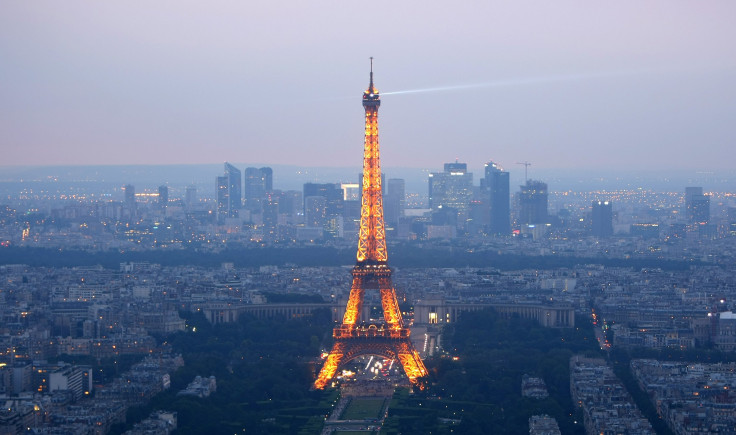Paris Tourism 'Suffering' After Terrorist Attacks, Dealing Blow To Businesses

Parisians like to say that in August, they leave the city for vacation and entrust the keys to the tourists.
This year, less tourists are taking up the offer, deterred by recent Islamist militant attacks in France.
Hotel occupancy fell by 12 percent in June this year, compared to June 2015, marketing consulting group MKG Hospitality said.
The number of flight arrivals for the month of July decreased by 10 percent compared to last year, according to travel data tracker ForwardKeys.
In previous years, it could take hours to queue in popular sites like the Louvre Museum and the Eiffel Tower. This time, lines are noticeably shorter.
A tourist from Canada, Pejman, said they visited Nice, and tried not to think of last month's deadly attack.
"So we were in Nice for two days and we enjoyed it, we tried not to think. We were sad, we saw the location that the sad accident happened and we were sad. But we try not to just get afraid because life has to go on," he said
France's tourism industry, an important driver of its economy, has suffered since Islamic State gunmen killed 130 people in an attack in Paris in November last year. It was dealt further blows in July when a militant killed 85 people by ramming a truck into crowds in the Riviera city Nice. Two weeks later, two men killed a priest in a small town in Normandy.
"We came here in France but it's hard because of the attack of terrorism, but we continue our life, our visit here in France," a tourist from Italy, Maria Theresa, said.
High-spending visitors from the United States, Asia and the Gulf in particular had been discouraged by the attacks, French tourism minister Matthias Fekl said in an interview with Sunday newspaper Le Journal du Dimanche.
Foreign tourist arrivals fell by 10 percent in the period of January-May 2016, compared to the same period in 2015, the Paris region's tourism office said.
The biggest drops in arrivals were among Japanese, down by 46 percent; Russians, down by 35 percent; and Italians, down by 28 percent. Chinese tourist arrivals fell nearly 20 percent.
According to an INSEE survey, Chinese tourists numbered more than 740,000 in 2015, growing 40 percent from 2014.
A tourist from China, Zheng Yi, said, "I feel safe in the public ground. But in some areas also maybe it is dangerous, especially (when there are) not so many people, maybe I will worry about. But in the public, in the public place, many police around here, maybe it's safe, with guns."
Thomas Deschamps, statistics officer for the Paris Convention and Visitors Bureau, said weakness in the sterling and the yuan, as well as economic woes in countries like Brazil and Russia due to falling petrol prices are also dampening the tourism outlook, in addition to security fears.
"The main reason for this fall (in the number of tourists visiting Paris) is the fear of the risk of attack, which is weighing on a lot of foreign customers, generally from far away, particularly Asian customers who are averse to risks, who don't know these security problems in their own countries in general - I'm particularly thinking of Japan - and who are afraid of coming to France, to Paris, in Europe generally," Deschamps said.
Tourism professionals also say negative perceptions about France have been fuelled by violent street protests this year as well as robberies targeting Asian visitors.
"All tourism professionals in Paris are suffering from today's climate in Paris, particularly hoteliers, because they are also suffering from competition by tourist accommodation like Abritel and Airbnb, who were pretty successful particularly during the Euros, while they (hoteliers) are experiencing a fall in customers; restaurant owners, who have a lot less foreign tourists in some areas; and then cultural sites which have a lot less visitors, you have a lot less queues at the Eiffel Tower, you have a lot less queues at the Louvre," Deschamps added.
Tour bus company L'Open Tour, which runs hop-on-hop-off routes across Paris, says they have seen a decline in number of bookings from tourists from the U.S. and Asia, particularly Japanese and Chinese.
"We see there is a general fall in tourist activity in Paris, all our partnerships, with the biggest tourism stakeholders are all suffering a fall, on the other hand the tourists who are in Paris, we're able to capture them, because we have reinforced our presence on the ground, because we have people at strategic points to explain how our activity works to the tourists, so yes we're able to capture the clients when they're here," marketing officer Elodie Delwaulle said.
Delwaulle added that they had to decrease the frequency of their bus by about 12 percent, in response to the fall in activity.
© Copyright IBTimes 2025. All rights reserved.





















